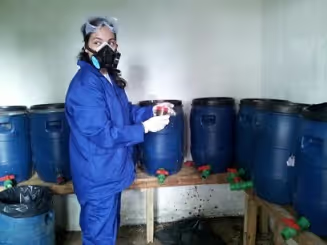Point-of-use test for detection of viruses

Diseases associated with lack of access to safe drinking water, inadequate sanitation and poor hygiene are the major causes of child mortality worldwide. During humanitarian crises, the availability of safe drinking-water sources become the biggest priority due to overcrowding and the easy transmission of fecal pathogens. Many orally transmitted viruses produce subclinical infection and symptoms are only observed in a small proportion of the population. However, some viruses may give rise to life-threatening conditions such as acute hepatitis in adults, as well as severe gastroenteritis in small children and the elderly. Human adenovirus (HAdV) and rotavirus are the most important pathogens for viral gastroenteritis in children; adenoviruses are also associated with pneumonia and respiratory diseases. Other water-borne diseases are acute hepatitis A and E caused by Hepatitis A and E viruses (HAV and HEV) with significant associated mortality, especially in pregnant women infected with HEV. Those viruses are excreted in faeces or urine and have been found in a variety of aquatic environments including contaminated ground water, river water or seawater.
Most of the water quality directives or guidelines use faecal bacteria (E. coli and enterococci) as water quality indicators (FIB), but it is well known that these indicators can fail to predict the risk of waterborne pathogens including viruses.

Although enteric viruses have been found in the aquatic environments, there is still a lack of comprehensive testing systems for monitoring the presence of these organisms. The monitoring of enteric viruses in source and drinking water would be useful for assessing the risk of human infection, to identify the sources of contamination, and also for outbreak investigation and evaluation of efficacy of sanitation measures.
This project has the main aim of developing the required equipment and protocols for an in-situ detection of viruses in water. The viral detection equipment will be available as a part of an early warning system that should be available for organizations involved in water sanitation and would facilitate the implementation of the control of viral pathogens in water improving water safety management practices and reducing incidence of viral diseases in humanitarian crisis contexts.
The research team is formed by Rosina Girones, Sílvia Bofill-Mas, Marta Rusiñol, Laura Guerrero and Eloy Gonzales from the Laboratory of Virus Transmitted by Water and Food from the Department of Microbiology of the Faculty of Biology (University of Barcelona). Geniul S. L. and Oxfam Intermon are collaborators in this project.
Stay updated
Sign up for our newsletter to receive regular updates on resources, news, and insights like this. Don’t miss out on important information that can help you stay informed and engaged.
Related articles


.png)
Explore Elrha
Learn more about our mission, the organisations we support, and the resources we provide to drive research and innovation in humanitarian response.